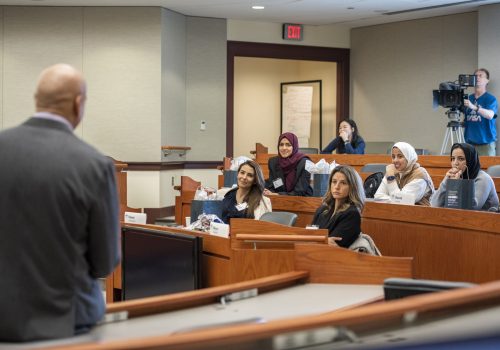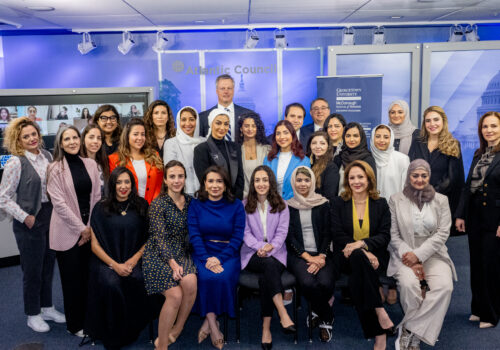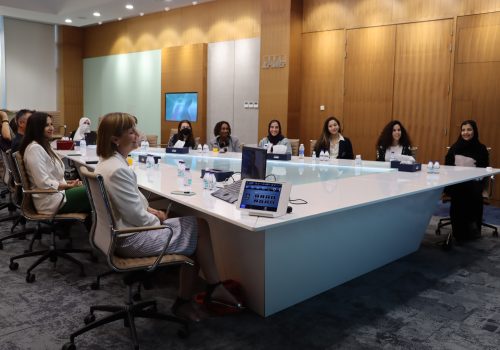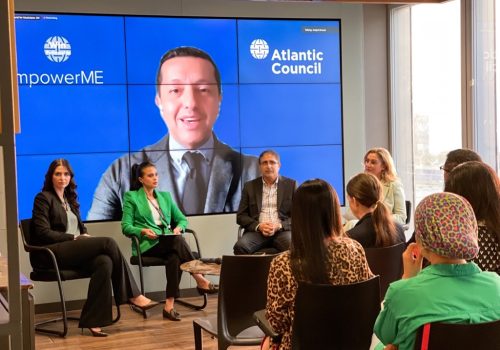How AI is reshaping the global business arena
On April 25th, the Atlantic Council’s WIn Fellowship held a panel discussion exploring the projected impact of artificial intelligence (AI) on the global business landscape, highlighting how AI-driven strategies are revolutionizing industries worldwide.
The panel, which was moderated by Stefanie Falconi, Emerging Technologies Advisor at USAID, featured four experts working at the forefront of artificial intelligence integration in their respective fields. Speakers included Xiuzhu Lin, Director of Global Business Advisory, AI, at Marriott International; Geoffrey Schaefer, Head of Responsible AI, Chief AI Ethics Advisor at Booz Allen Hamilton; Wafa Ben-Hassine, Principal, Responsible Technology at Omidyar Network; and Aisha Saaka, Data & AI Manager at Accenture Federal Services.
The conversation ranged widely, with the speakers leveraging their expertise on the technology across sectors to touch on best practices for AI integration in companies, AI’s role in addressing social challenges, and responsible development and deployment.
Main Takeaways
Wafa Ben-Hassine kicked off the panel by explaining that society should guide the development and deployment of AI in order to harness its transformative power for good. Generative AI is one of the most promising technologies to emerge since the industrial revolution, and humanity should adopt a holistic approach for managing its growth. She proposed the implementation of guardrails developed by both civil society and technical experts to help mitigate AI’s risks.
Building on this theme, Xiuzhu Lin shifted the focus to the practical aspects of AI in business, discussing the conditions necessary for companies to effectively utilize AI. She pointed out that a business’s maturity often facilitates successful AI integration, exemplified by banks like Chase that have long employed machine learning and data science experts. Businesses adopting AI must often complete necessary pre-work, such as cleaning up their datasets. Lin advised those hoping to embrace AI to consider whether the technology aligns with their industry and if their companies have reached the maturity needed to take full advantage of it.
Geoffrey Schaefer then critiqued the top-down approach to managing generative AI, suggesting it hinders its transformative potential. He advocated for a more decentralized approach, allowing employees to tailor AI tools to their specific needs, which he argued could significantly boost productivity. Centralized dictums and protocol on how to use the technology could be less effective than simply putting it in as many hands as possible and allowing employees to adapt it to the idiosyncrasies of their individual work. The thinking goes that employees will find the most efficient ways to integrate AI tools into their own workflows, supercharging productivity from the bottom up. However, Schaefer also acknowledged the necessity of implementing strict guardrails to prevent issues such as the leakage of proprietary information.
Echoing the importance of a mature approach to AI, Aisha Saaka agreed with her co-panelists on the need for decentralization. Speaking on the public sector, she noted that end users want both trust and accountability to be integral to AI. One challenge that could arise when working with public sector partners is the inability to train their models through exposure to the wider internet. Saaka underscored the public’s desire for trust and accountability in AI applications, particularly in sensitive areas.
Further exploring AI’s broader implications, Xiuzhu Lin responded affirmatively to the role of AI in addressing significant policy issues, like sustainability modeling. Sustainability modeling, for instance, is an area where AI’s strengths in passing through large data sets, finding patterns, and modeling scenarios could be well leveraged. She nonetheless wondered whether humans will adequately utilize the capabilities and insights that AI will deliver. Schaefer added that AI is the greatest public policy tool ever invented. Counterintuitively, biased data may have useful implications for improving policy; he pointed to the discovery of the link between zip codes and race in America as a revealed bias that could be positively utilized. Thinkers should grapple with how AI can make society more perfect without expecting perfection from AI.
Towards the conclusion of the discussion, Wafa Ben-Hassine revisited the theme of AI’s speed and connectivity, suggesting it could revolutionize public policy engagement. She projected an opportunity to leverage its connective abilities in public policy spaces by helping citizens engage more efficiently with their governments, improving upon inefficient bureaucracies. However, she warned against deploying AI in high-stake areas without adequate safeguards. Governments such as France (which recently declared it would use AI to improve its public services) against deploying AI in contexts where failure creates measurable harm, such as on issues of criminal justice or social security.
Aisha Saaka shared her positive outlook, reflecting on how AI facilitated syndromic surveillance during the COVID-19 pandemic. She caveated her excitement by noting the prevailing need for local context to identify social and public health interventions.
Ben-Hassine argued for diverse participation within tech companies and public bodies and provided three frameworks for promoting inclusion: inclusivity from the outside-in, wherein communities are brought to developers and share their experience; inside-out, wherein a diverse staff of employees can understands possible harms, issues, and needs; and the feedback loop between the two previous frameworks, given that the evolution of technology changes the scope of impact on different communities.
Meanwhile, Geoffrey Schaefer posited that AI could mend national social cohesion by improving interactions between Americans and their government. The rise in populism, anger, and dissatisfaction in the United States should be not surprising given that the touchpoint between many Americans and their government are frustrations like potholes, the Department of Motor Vehicles, and the Internal Revenue Service. Schaefer pointed out that by using AI to meet people’s needs more efficiently on the national level, trust can be restored in government and the degradation of the American social fabric can be halted.
In closing, Aisha Saaka highlighted a gap in technology education in the U.S., advocating for an educational campaign to better inform the public about AI. The average person probably does not fully understand how AI works, and an education campaign around the technology would be valuable. Xiuzhu Lin wrapped up by pointing to the practices of Anthropic, a company focused on ethically aligning AI with human values, underscoring the ongoing discourse on AI’s role in society.
The Way Forward
AI’s rapid evolution is a game-changer for businesses, altering operational frameworks and setting new benchmarks for efficiency and innovation. By automating routine tasks and analyzing vast datasets for actionable insights, AI is proving to be a crucial driver for growth, decision-making enhancement, and competitive edge in a dynamic market environment. However, the widespread adoption of the technology also brings both known and unknown risks and raises questions over ethical governance and implementation of AI.
Recent studies indicate that sectors like manufacturing, information technology, and healthcare are at the forefront of AI adoption, seamlessly integrating AI solutions into their core operations. Companies experienced in machine learning and data management are particularly well-equipped to capitalize on AI’s potential. Nevertheless, any business can advance by decentralizing AI usage and empowering employees to determine how best to implement AI in their specific roles. To navigate these changes, multi-stakeholder guardrails involving civil society, technical experts, and policymakers are essential to ensure that AI development aligns with societal values and needs. Businesses should assess their readiness for AI, customizing tools to meet operational demands and boost productivity, while the public sector should focus on AI applications that enhance efficiency without compromising safety. Moreover, continuous education across all societal levels is vital, coupled with public awareness campaigns that elucidate AI’s capabilities and limitations.
In terms of policy and social impact, AI should be utilized to analyze data for informed policymaking. Proactively addressing and leveraging biases in data can lead to societal improvements. Inclusion of diverse groups in the AI design and development process is critical to avoid marginalizing vulnerable communities, and regular evaluations are necessary to ensure AI technologies evolve in response to societal needs. By adopting this comprehensive approach, we can leverage AI’s advantages responsibly and ethically, fostering societal well-being and stimulating economic growth through proactive governance and inclusive practices.
JP Reppeto is a Young Global professional in the Atlantic Council’s Middle East programs
Explore the WIn Fellowship
Recommended content

empowerME
empowerME at the Atlantic Council’s Rafik Hariri Center for the Middle East is shaping solutions to empower entrepreneurs, women, and youth and building coalitions of public and private partnerships to drive regional economic integration, prosperity, and job creation.





